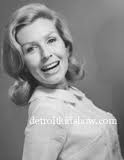My daughter, who turned 11 yesterday, has informed me that she wants to be a food critic. I love her reasoning: You get free food, you get to tell people how it is, and you get paid for it.
But I wonder if she’s thought this through.
For example, does she know that a food critic has to be knowledgeable about fine dining, gourmet cooking, food history, the restaurant scene, chefs’ backgrounds, etc.? Does she realize that decent writing skills are a prerequisite if she wants to be successful? Does she recognize that Food Network stars like Anthony Bourdain and his butter-loving nemesis, Paula Deen, weren’t just handed TV shows? And, finally, does she understand that no matter what she tells me she wants to be when she grows up, she is absolutely, positively going to college? (I think I’ve successfully drilled that last part into her brain.)
I ask her these questions because I lacked a professional female role model at her age. I was all set in the “how to be a good mom” department. My aunt, who raised me, was an amazing mother. But most women I knew didn’t work outside the home, which meant I didn’t know any female doctors, lawyers or accountants.
In search of some guidance, I turned to my perpetual babysitter, the television (don’t judge my aunt; it was the ’70s, after all). On the evening news, I saw blond and beautiful Marilyn Turner, the WXYZ-TV Detroit weather girl. I watched her smile and “forecast” the weather (i.e., read the teleprompter), and I was hooked. I drew a map on my chalkboard and I practiced … a lot. Let’s face it: You sometimes find odd ways to amuse yourself when you grow up without siblings your age.
In the mornings, my TV babysitter presented me with an alternative career goal. While watching Rita Bell, host of “Prize Movie,” give away countless dinners for two at the Roostertail, I decided that being a waitress at the glamorous waterfront restaurant might be right for me.
How I ended up an editor is a whole other story, complete with lots of twists and turns, and I’m not sure I ever shared these childhood career goals with anyone in my family. I lived in my head a lot as a kid — also a product of being a virtual only child. But these early notions of what I might like to do as an adult are why I ask my daughter pointed questions about her career aspirations. I know they will change over the years — mine sure did — and the end goal, of course, is finding something she’s good at and loves to do. Whether she ends up a food critic or a brain surgeon, I hope I can offer her a little guidance along the way.

